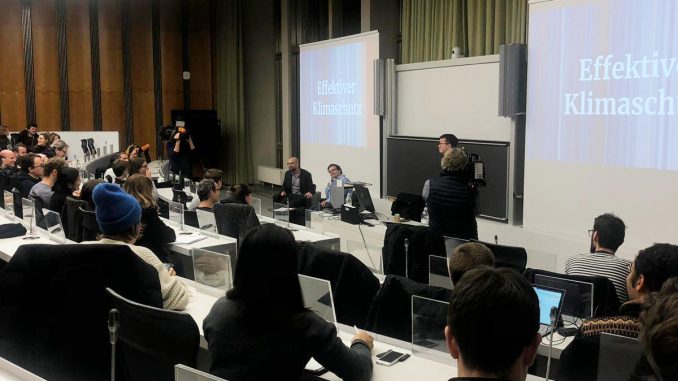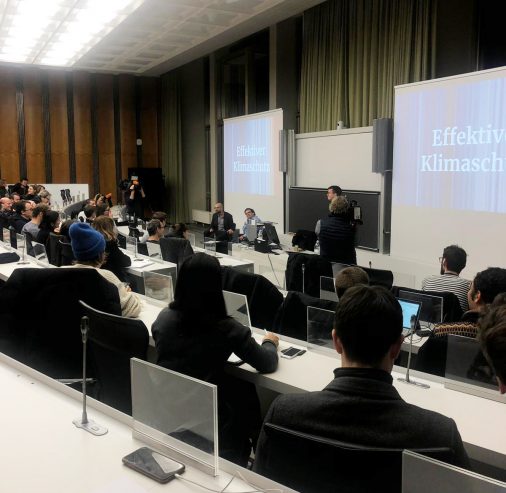
By Johannes Ackva, Founders Pledge
With the meager outcomes of the Madrid climate conference, it is easy to lose hope.
After a year of increasing pressure to meaningfully address climate change, progress has been – once again – very limited and slow. Meanwhile, global emissions keep rising rather than, as paths to limit warming imply, approaching zero.
Indeed, Greta Thunberg, the head of the global #FridaysForFuture movement, said that the climate strikes “have achieved nothing.” Whether or not that is true, it is quite clear that the world is currently not on a trajectory to achieve the ambitious climate targets of the Paris Agreement (keeping warming “well below 2 degrees”).
Luckily, the situation is not hopeless. There are effective things each of us can do to help avoid the worst impacts of the climate crisis.
While many of us have started to change our behavior and consumption or participate in protests, an often-overlooked opportunity in the climate space is charitable giving to organizations pursuing particularly promising strategies to reduce emissions.

At a recent event here at ESMT Berlin organized by Net Impact and the donation platform effektiv-spenden.org, we tackled this avenue of climate action. After an introduction by Effektiv Spenden’s Sebastian Schwiecker showing the limits of what we can do as individuals through our own behavior, Hauke Hillebrandt of Let’s Fund and myself (of Founders Pledge) laid out how we identified effective giving opportunities in the climate space that are now featured on the climate section of effektiv-spenden.org.
Drawing on our published research (here and here), we emphasized three key points:
The world’s demand for energy is increasing as poorer nations get richer.
With increased energy use very closely tied to economic development, the majority of global carbon emissions are shifting towards poorer nations. Leading analysts expect that 75 percent of emissions will originate in emerging economies by 2040. Of course, given their historically high emissions, that does not justify inaction on the part of wealthy countries. However, it shows that effective strategies to deal with climate change need to grapple with this reality by making this energy provision as clean as possible.
Leverage through energy innovation is plausibly the most cost-effective strategy.
While, in principle, we can achieve global leverage through many different strategies – for example, by directly financing clean energy infrastructure in other countries or by establishing a global carbon market – energy innovation is plausibly the most cost-effective lever. This is because clean energy innovation is “overlooked and underfunded” and even a single rich country could easily double the global energy innovation budget, which is a meager $22 billion per year. Public innovation and subsidies for early deployment by just a few countries, including Germany, brought us the radical cost declines of solar energy. This stands in sharp contrast to many other approaches that require global cooperation or much higher investments. For example, while a global carbon market has been a goal of international climate policy for the past two decades, we are still far away from a market that is able to deliver the intended results.
There are highly effective charities in this space that can influence energy innovation budgets of major countries.
To put this strategy into action, we spent hundreds of hours evaluating charities that best incorporate the above ideas and that have a track record of effectively influencing the most important government for energy innovation – the United States. Beyond their general effectiveness in influencing policy – affecting budgets hundreds of times larger than their own –we also examined their room for more funding, ensuring that additional money through donations could increase their impact.
Based on this analysis, we selected three organizations that present outstanding giving opportunities:
The Clean Air Task Force (CATF, donate here) has been at the forefront of innovative climate advocacy since 1996. It focuses on advancing critically needed technologies that have been neglected by other actors, making its work even more impactful.
The Clean Energy Innovation Program of the Information Technology and Innovation Foundation (ITIF, donate here) is a dedicated champion of energy innovation located in Washington, DC. Its policy research focuses on increasing and improving public clean energy R&D both in the US and globally. It communicates this research to policymakers through meetings, training for legislative aides, frequent reports, and public commentary.
Of course, climate change is not only about technology. For those that prefer to give to a charity that focuses on non-technological solutions, we also recommend the Coalition for Rainforest Nations (donate here), an intergovernmental organization that seeks to protect tropical forests by enabling markets that reward countries for avoiding deforestation.
We believe that these charities are our best bets to avoid emissions in a world where energy demand is growing as larger parts of the world escape dire poverty.
